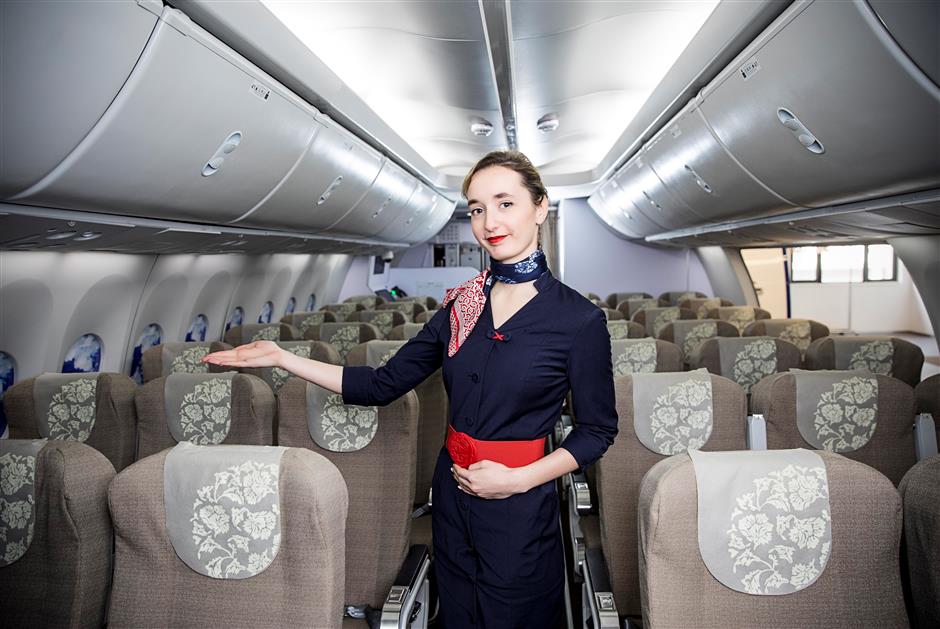A French flight attendant's cultural journey in China

Lucine Magand, a China Eastern Airlines flight attendant, aboard an aircraft.
French expat Lucine Magand has found her second home in Shanghai. As a flight attendant for China Eastern Airlines for four years, she thinks of herself as a "cultural ambassador" of the growing closeness between China and France.
"Li Xi 李希, with the word 希 meaning 'hope' in Chinese, is my Chinese name," Magand said.
She can vividly recall her first day in Shanghai. "I was immediately struck by the city's vibrant energy."
Fluent in Mandarin after studying at Shanghai Jiao Tong University for three years, she quickly adapted to life in the city. She made many friends and even found love. Her husband is a Shanghai native.
"I have a great impression of Shanghai people – they are friendly and open, making my life here as a foreigner very pleasant and comfortable," she said.
Magand's experience in Shanghai has been deeply influenced by the country's technological advancements. She marveled at the ubiquity of QR codes, a stark contrast to the cash-centric Europe she left behind. "The convenience is astounding," she said.
Her experiences extend to the innovations at Beijing's Daxing Airport, where facial recognition technology facilitates boarding without physical or printed boarding passes.
Her tenure with China Eastern coincided with a pivotal moment – the COVID-19 outbreak. The pandemic marked a challenging year, but Magand applauded the Shanghai government for its effective response.
"The dissemination of knowledge, voluntary vaccination appointments, and timely area-specific pandemic reports made life safer and enjoyable despite the situation," she recalled.
She said the pandemic also brought China and France closer, as both nations engaged in cooperative efforts to combat the virus.
The symbolic "CIIE-themed" flight to Paris by China Eastern Airlines, where she was designated, maintained crucial air links even during the pandemic, demonstrating the strength of Sino-French relations and solidarity in crisis, she said.
"Now, more flights between China and France signify strengthening ties and reducing distances," Magand said, adding she felt proud of her role in this cultural exchange.
The number of Sino-French weekly flights had grown from 16 to over 50 by June 2023, amounting to over a half of the flight volume allowed in the summer of the post-pandemic era.
This expansion includes major airlines such as Air China, China Eastern, China Southern, Xiamen Airlines and Air France, with routes covering Paris to major Chinese cities such as Beijing, Shanghai, Guangzhou and Fuzhou.

Lucine Magand, a "cultural ambassador" of the growing closeness between China and France.
Witnessing the increase in flights and interactions, Magand said she sees the role of an "air bridge" in bringing China and France closer.
"On each flight, I try to blend the best of both worlds – the efficiency and warmth of Chinese hospitality with the elegance and charm of French culture. It's about creating a unique experience for our passengers," she said.
Discussing Sino-French relations, Magand highlighted the potential of the Belt and Road Initiative to enhance opportunities in French and European agriculture, notably in the grain, dairy and wine sectors.
According to the France's Institute of International and Strategic Relations, there are increasing imports of meat and a growing demand for dairy with changing lifestyles in China.
In Brittany, France, for instance, factories have been set up to produce infant milk products. Bordeaux's wine industry has also seen Chinese investment.
The institute said the Belt and Road Initiative is bringing increased opportunities for French and European agriculture and it is essential to give careful consideration to the agricultural aspects of the initiative.
Eastern Airlines Logistics has collaborated with French wineries since 2014 to bring high-quality new wines from Bordeaux to the domestic market.
Magand expressed her desire to experience more French products in China and to introduce the Chinese goods she loves to France.
"My personal hope is to experience more of France in China and to share my favorite Chinese products with France," she said.
In the first half of 2023, the passenger transport volume of the Belt and Road Initiative regions accounted for 71 percent of China's international aviation market, a 13-percentage-point increase compared to the same period in 2019, according to the Civil Aviation Administration of China (CAAC).
As of September 2023, the volume of cargo and mail transported via the "Air Silk Road" accounted for 26 percent of China's international air freight market, marking a 4-percentage-point increase from the same period in 2019, the CAAC said.
Working on the "Air Silk Road," Magand has witnessed the progress made in linking China with other countries under the initiative.
"I believe that the 'Belt and Road' is more than infrastructure and trade. It's about building lasting relationships. And I am proud to be a part of that," she said.















